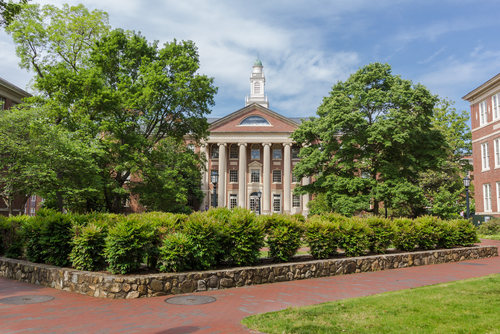Domestic terrorism charges that triggered campus ban of 2L aren't supported, defense counsel say

The University of North Carolina at Chapel Hill in Chapel Hill, North Carolina, on May 19, 2015. Image from Shutterstock.
The University of North Carolina at Chapel Hill is prohibiting a law student from attending classes in person or participating online following a domestic terrorism arrest at an Atlanta music festival that protested a new police training facility.
Jamie Marsicano, a 2L, uses they/them pronouns. The university identifies Marsicano as “she,” and Atlanta police use “he,” says Erin King, Marsicano’s defense lawyer. Marsicano is also represented by Robert Rubin.
In a March 5 news release, the Atlanta Police Department identifies the student as “James Marsicana.” The 35 people arrested March 5 allegedly charged the construction area where the training facility is being built and threw large rocks, bricks, Molotov cocktails and fireworks at police officers, according to the news release.
Marsicano attended the South River Music Festival on March 4 and 5, Marsicano’s lawyers say. The event kicked off a week of action to “Stop Cop City” and defend the Atlanta forest, according to a South River Music Festival Instagram post.
Rubin says there is no evidence placing Marsicano at the incident site, and Marsicano was arrested at the music festival. At a bond hearing, a prosecutor said Marsicano was arrested because they were wearing muddy, black clothing and had 2016 and 2017 arrests tied to protests, the Washington Post reports.
The government claims that protesters who fled the construction site got wet crossing a creek to get to the music festival, while protesters argued that it had rained two days before, and the festival grounds had muddy areas, according to the Washington Post.
If convicted, they face up to 35 years in prison, Rubin says. Previously, Georgia’s domestic terrorism statute criminalized acts intended to likely kill or injure at least 10 people. It was amended in 2017 to include actions meant to destroy critical infrastructure. The first charges under the revised statute dealt with “stop the cops” arrests, King says.
A media relations manager for the University of North Carolina told the ABA Journal that the Family Educational Rights and Privacy Act prohibits them from commenting on the matter. According to Rubin, the decision was made by the university chancellor in conjunction with the emergency evaluation and action committee.
According to university website language, the committee has jurisdiction over students whose behavior on or off campus could be a continuing danger for the university community or property.
“But it is confusing to us, since there are no clear procedural rules for this hybrid decision-making,” Rubin says, adding that he and his team have filed an administrative appeal.
On April 13, more than 100 students at the University of North Carolina participated in a walkout supporting Marsicano, the Daily Tar Heel, a student newspaper, reported.
Marsicano was a dean’s fellow, which involves mentoring 1L students, according to the law school’s website. They were also a member of a student wellness committee, an Outlaw board member and president of the law school’s National Lawyers Guild chapter, according to their lawyers. Under their sanction, Marsicano can’t participate in these activities, according to Rubin.
“It’s unfortunate the university would consider it proper to remove such an important member of the UNC law community and, ironically, remove them in the name of protecting the various students Jamie has been protecting since their admission to law school,” Rubin says.
Write a letter to the editor, share a story tip or update, or report an error.



